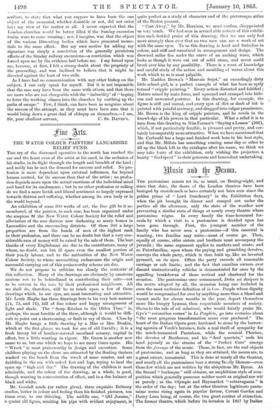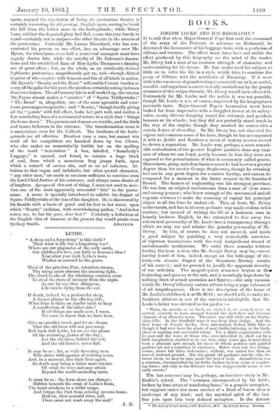)11asit aaV tly ginnua.
THE pantomime season set in, as usual, on Boxing-night, and since that date, the doors of the London theatres have been besieged by crowds such as have certainly not been seen since the golden prime of "Lord Dundre,ary" in the Exhibition days, when the pit brought its dinner and camped out under the portico all the afternoon, only the state of the weather now preventing a similar state of things at nearly every theatre where pantomime reigns. In every family the time-honoured for- mula by which a visit to a pantomime is decided upon has been gone through. First, the youngest member of the family who has never seen a pantomime—if this essential is wanting, two families may unite—must of course go. Then, equally of course, older sisters and brothers must accompany the juvenile ; the same argument applies to mothers and aunts; and so Paterfamilias, upon whom the paying and grumbling devolve, convoys the whole party, which is thus built up, like an inverted pyramid, on its apex. Often the party exceeds all reasonable carriage or cab limits; and the fact that omnibus owners ever discard unstreetworthy vehicles is demonstrated for once by the appalling breakdowns of those revived and chartered for the occasion. The pantomime once commenced, Duke eat desipere is the motto adopted by all, the occasion being one included in even the most exclusive definition of in &co. People whose dignity would be compromised for ever by anything more than a bland and vacant smile for eleven months in the year, deport themselves more like hungry hymnas, than respectable members of society. Slaves to the rule of nil admirari, who would faintly praise Mr. Gye's "coronation scenes" in Le Prophete, go into ecstacies about "the most gorgeous transformation scene ever produced." The heart of the Italian Opera-goer, hardened to stone by the harrow- ing agonies of Verdi's heroines, feels a real thrill of sympathy for the much-tormented Pantaloon, while the musical Pharisee, the devotee of Beethoven, and his "deaf quartets," nods his head joyously as the strains of the "Perfect Cure" emerge from the farrago of the music. These, in fact, are the real objects of pantomime, and as long as they are attained, the means are, to a great extent, immaterial. This is done at nearly all the theatres, and nearly all the pantomimes bear a strong lamily likeness—even those few which are not written by the ubiquitous Mr. Byron. At the Strand " burlesque " still obtains, an amphibious style of com- position which generally possesses neither merit as original nor wit as parody ; at the Olympic and Haymarket " extravaganza " is the order of the day; but at the other theatres legitimate panto- mime seems rising again in popular favour, Covent Garden and Dain7 Lane being, of course, the two great centres of attraction. The former theatre, which before its invasion in 1847 by Italian
opera, enjoyed the reputation of being the pantomime theatre is certainly recovering its old prestige, English opera serving to break the fall from the loftier muse to the harlequinade ; while Drury Lane, whither the departed glory had fled, seems this year barely to equal—certainly not to surpass—the other theatre in the success of the pantomime. Certainly Mr. Leman Blanchard, who has con- centrated his powers on one effort, has an advantage over Mr. Byron, for whosepuns some half a score rival managers must have eagerly drawn lots, while the novelty of Mr. Falconer's decora- tions and the established fame of Miss Lydia Thompson's dancing are of great effect ; but, on the whole, as an artistically-devised legitimate pantomime, magnificently got up, and—though diluted in point of wit—replete with humour and fun of all kinds in action, Mr. Byron's "Beauty and the Beast" will enable Covent Garden to carry off the palm forthis year, thequestion certainlyresting between those two houses. The old nursery tale is well worked up, the veteran .
Mr. Payne almost makes a "creation" of "Squire Tiddlywinks ;" "The Beast" is, altogether, one of the most agreeable and cour- teous personages imaginable ; and "Beauty," though hardly giving all the "points" with full effect, looks her part well, and recites a few concluding lines of a sentimental nature in a style that "brings the house down." The gnomes and demons are terrific, and the birds and beasts ludicrous in the extreme. The transformation scene is a masterpiece, even for Mr. Callcott. The incidents of the harle- quinade are all effective. Deerfoot runs a race, but cannot win until all his competitors are knocked down by the Clown, who also makes an unmistakably bubble bet on the spelling of the word " ra(e)indeer." A box, labelled, "Somebody's Luggage," is opened, and found, to contain a huge block of coal, from which a monstrous frog jumps forth, upon which a council of savans sits, and so on ad infinitum. Al- lusions to that vague and indefinite, but often quoted character, "any other man," are made in numbers sufficient to convince even the Lord Chief Justice of his existence, and always cause shouts of of laughter. Apropos of this sort of thing, I must not omit to men- tion one of the most apparently successful "hits" in the panto- mime A scene is specially introduced to exhibit the despair of Squire Tiddlywinks at the loss of his daughter. He is discovered by his fireside with a basin of gruel and his feet in hot water, upon which "Beauty" exclaims, with overwhelming pathos, "And in hot water, see, he has his poor, dear feat !" Certainly a definition of the English idea of humour at the present day would puzzle even































 Previous page
Previous page